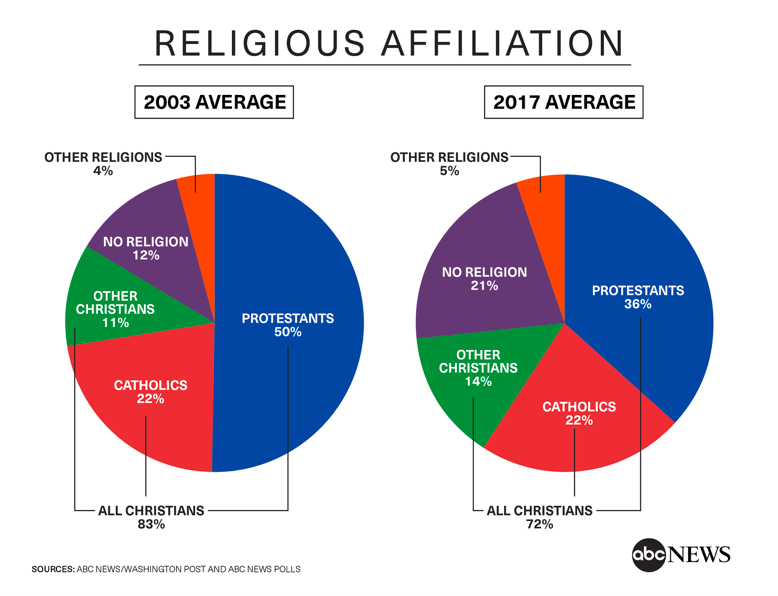An ABC News poll finds a decline in religious affiliation among Americans between the years 2003 and 2017.
Evangelical white Protestants are of particular interest in political terms, since they’re a core group within the Republican coalition; 80 percent supported Donald Trump in 2016. Evangelical white Protestants’ share of the total adult population has gone from 21 percent in 2003 to 13 percent last year. Non-evangelical white Protestants have gone from 17 to 11 percent.
…No Religion
As the share of Protestants has declined, the number of adults expressing no religious affiliation has risen from 12 percent in 2003 to 21 percent of all adults in 2017. That includes 3 percent who say they’re atheists, 3 percent agnostic and 15 percent who say they have no religion. The proportions were similar 15 years ago.
The largest shifts during this 15-year period include 16-point increases among young adults (age 18 to 29) and political liberals. The smallest changes have occurred among Republicans, conservatives and blacks (+4 points in each group) as well as older Americans, +5 points.
Having no religious affiliation is most prevalent among 18- to 29-year-olds, at 35 percent, vs. 13 percent among those age 50 and older. It’s also higher among men than women (25 vs. 17 percent), among college graduates vs. those without a degree (25 vs. 20 percent), and among whites and Hispanics than among blacks (22 and 20 percent vs. 15 percent).
Signs of movement away from religion are always encouraging.
Kevin Drum argues that the decline among white evangelical Protestants is the reason why they have embraced Donald Trump so ardently and ignored the fact that is represents pretty much the opposite of everything they claim to value. It is because they see him as their last chance to wield influence.


The Catholics have held steady at 22%?!?
I can only surmise the net immigration of LatinX believers somehow equals the total exoduses* of fundagelical converts, disbelievers and the morally appalled.
*From a Greek root, so not exodi.
Let’s just hope these young Nones get off their asses and vote.
Interestingly different religious mix than we have in Canada. https://en.wikipedia.org/wiki/Religion_in_Canada
I didn’t see a 2016 equivalent graph so the data is out of date.
@jrkrideau:
Not surprising that Canada has a higher Catholic percentage, between Quebec being predominantly Catholic at the start, and Canada never really had the sort of ‘Great Awakenings’ that resulted in a whole lot of splinter Charismatic sects in the U.S. Instead Canada followed the more ‘gradual disillusionment’ trail of England as far as religiosity is concerned.
It seems to have been an unfortunate side effect in the U.S. that the lack of an ‘established’ church helped lead to a whole bunch of minor groups and outright cults growing to greater prominence.
Unfortunately, it’s not like we’re lacking for people up here who think the U.S. model of performative religiosity in politics is a good idea.